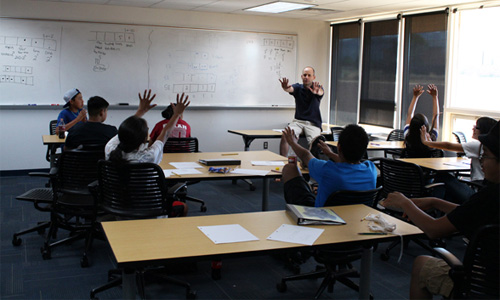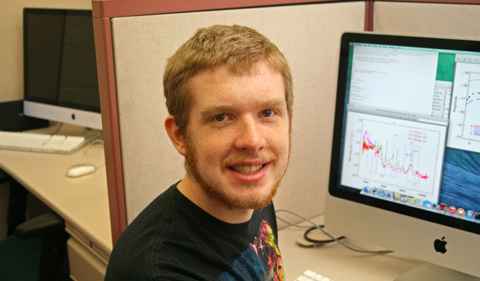
Associate Professor of Mathematics Bob Klein presents at a briefing on Capitol Hill highlighting key findings in a report Klein helped compile on issues facing rural education in the United States.
Dr. Robert Klein, Associate Professor of Mathematics, is seeking an undergraduate research apprentice to travel with him to the Navajo Nation in Arizona this summer and work during the academic year on developing teacher scripts for Math Circles in Navajo Nation schools.
College of Arts & Sciences freshmen, sophomores and juniors are eligible for the Undergraduate Research Apprenticeship Pilot Program 2015-16. The program hires students to work on faculty members’ research projects.
Klein’s apprenticeship is for 80 hours during the summer and 220 hours during the 2015-16 academic year.
The Honors Tutorial College, in partnership with the Vernon R. and Marion Alden Library Endowment, the College of Arts & Sciences, the College of Health Sciences and Professions, the Gladys W. and David H. Patton College of Education, the Russ College of Engineering and Technology, the Scripps College of Communication, University College, and the Office of the Vice President for Research and Creative Activity, invites all interested Athens freshmen, sophomores, and juniors to apply for the 2015-16 research apprenticeships.
How to Apply
The deadline to apply is 5 p.m. on March 13. To apply for this internship, you must email Dr. Robert Klein at kleinr@ohio.edu. The email should briefly explain your qualifications and interest in the project (no more than three paragraphs) and have an attached resume. It is strongly recommended that you meet with an adviser in the Career and Leadership Development Center in Baker Center 533 to help you compose your letter and resume before applying for a position.
Project: Evaluating Teacher Scripts for Math Circles in Navajo Nation Schools
The principal research activity for the student will be to collaborate in an extant design research project that proposes to have mathematicians around the United States develop scripts around the well-tested Mathematics Circles model for K-12 teachers on the Navajo Nation to implement in their classrooms and after school. Mathematics Circles ask students to persist with a rich mathematics problem, sometimes for up to 1.5 hours. These problems, guided by professional mathematicians, are designed to be “low threshold, high ceiling” problems that communicate the joy of engaging in mathematical inquiry. The Navajo Nation is larger than 10 U.S. states, including West Virginia and the 200,000 residents live and work in persistent poverty. This project shares the expertise of more than 40 mathematicians internationally and is working to develop a Navajo-sustained effort to improve STEM performance, college matriculation, and eventually the return of Navajo STEM professionals to help confront issues facing the Navajo Nation. The project is currently the subject of a documentary film Navajo Math Circles in production and gives a good sense of the scope and motivation of the project.
Student’s Role in Project and Benefit to Student
The apprentice will help to design and redesign rubrics and templates for script development, implementation, evaluation, and redesign. Partner schools, teachers, and mathematicians are already in place and a grant from the National Science Foundation supports the work of Klein but not an undergraduate. Nevertheless, including undergraduates in the process stands to benefit the project, the student, and the Navajo students. The apprentice’s work involves organizing and producing documentation, evaluation protocols, communications with Navajo Nation partners, collecting and analyzing classroom data, and likely collaborating in the production of a research report and peer-reviewed journal submission (depending on the apprentice’s interest and writing skills). Klein will further mentor the student to submit a proposal to the Ohio University Research and Creativity Expo to report on evaluation efforts.
To gain an understanding of the complex context of the work, the student will attend the July 14-28 summer immersion for students, acting as a peer mentor for the Navajo students and assisting the project leadership in managing and leading the immersion. This will allow the apprentice to begin to understand the unique challenges, history, and culture of the Navajo and therefore the context of the project goals. Mathematics and education are further contexts for the work so Klein further anticipates that the apprentice will gain understanding of what constitutes good problems and how content drives pedagogy.
The primary benefits for the student are anticipated to be in the areas of design research, management, education, and policy. Writing and communication are further skills that Klein will to develop with the student.
Desired Qualifications for Apprentice (e.g. course background, skills, computer expertise, interest, etc.)
Given the contexts described above, the apprentice needs the following skills and background, organized according to “minimum” and “desired.”
Minimum
- Mathematics: Discrete Mathematics and Calculus I.
- The apprentice should be self-motivated, task-oriented, and organized. The apprentice should further be punctual and attend to deadlines.
- The apprentice should be available July 12-30, 2015 for travel to the Navajo Nation. (The project will arrange travel by car with Klein to the Navajo Nation and back to Athens, OH.
- The apprentice should evidence strong writing and communication skills. Proficient with email, Microsoft Word & Excel.
- Professional appearance and demeanor.
Desired
- Mathematics: 1-2 proof-based courses in mathematics.
- Experience working with middle- or high-school students.
Timeline for Work
Summer 2015
July 12-13: Travel to Diné College, Tsaile, AZ, Navajo Nation
July 14-28: Assist with Student Math Circles and Math Teacher Circle, attending and assisting in mathematical and cultural activities.
July 29-30: Return to Athens, OH
August 15: Journal due – the apprentice will maintain field notes throughout the summer immersion and share the notes and a summary report with Klein.
Fall 2015
September: Read all extant “scripts” for teacher-led circle problems.
Co-construct script template for soliciting further script contributions from mathematicians. Co-construct rubric for evaluating scripts.
October: Co-develop teacher facilitation packets to be distributed to Navajo Nation teachers for implementation. Coordinate with Diné College partners in recruitment, scheduling, and collection of scripts and evaluations. If Klein secures funding and the apprentice is available, we will co-present on the work at Ohio Council of Teachers of Mathematics annual meeting.
November: Establish a blueprint for analyzing the evaluation data and redesigning scripts. This follows a design research model. Redesign at least one script to test the model. Dr. Mathew Felton (Patton College of Education) will meet with the student and Klein, separately to serve as an external evaluator for the apprenticeship process.
December 1: Fall report due to Klein summarizing activity and reflection on what the apprentice has learned and still wants to learn. Klein will share the summary with Dr. Mathew Felton in the Patton College of Education. Felton meet with Klein and offer suggestions for how to refine and improve the apprenticeship process. Klein will share these results with the apprentice.
Spring 2016
For Spring, the Fall cycle continues: collecting scripts, implementing them, and evaluating them. Additional activity follows.
January: Ohio University Research and Creative Activity Exposition proposals. Klein will work with apprentice on the proposal. Klein will attend the Joint Mathematics Meetings in Seattle, WA and would like to include the apprentice in presentations and participation in meetings with the co-directors of the Navajo Nation Math Circle Project. This participation depends on student availability and funding. Klein will actively seek funding for the student.
February: Klein makes another trip to the Navajo Reservation over spring break. If work merits it and funding can be secured, the apprentice may be able to join Klein.
March, April: Further refinement of scripts and the mechanism for distributing completed scripts. The apprentice will present a summary report of activity, including the attainment of apprenticeship goals and a list of desired future activity (if any).
Klein and the apprentice will (assuming availability of student and funding) propose a presentation to the Mathematical Association of America’s Mathfest to be held in Columbus, OH in August 2016.
Klein and apprentice will work on a joint report and paper to be submitted to a peer-reviewed journal or venue such as the American Journal of Undergraduate Research.
Klein will work with the student to secure relevant IRB assurances and documentation. Klein will further adhere to all Ohio University rules governing travel, procurement, and ethical standards.



















Comments